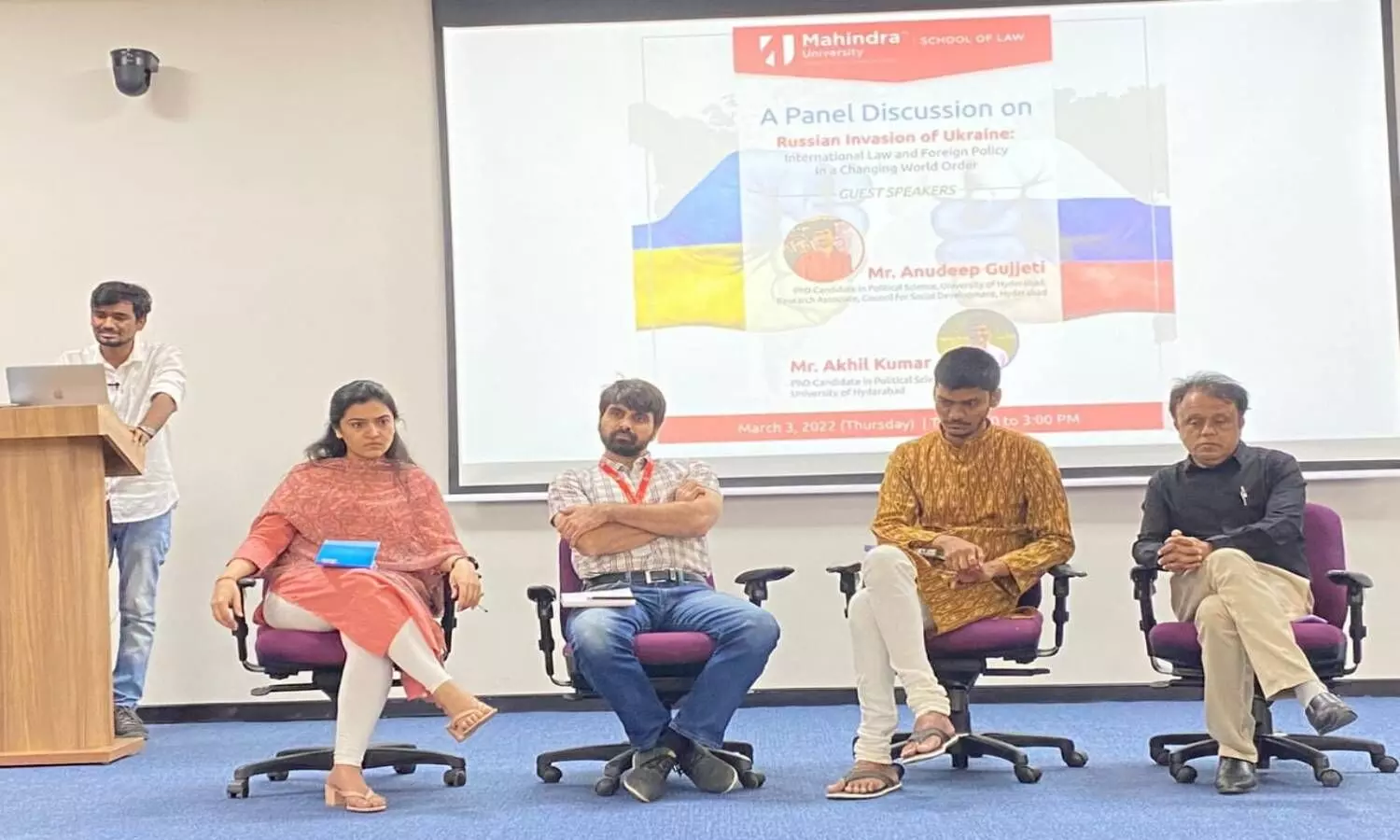Mahindra Law School meet demands Russia halt illegal invasion of Ukraine
The School of Law, Mahindra University organised a panel discussion on ‘Russian Invasion of Ukraine: International Law and Foreign policy in a Changing World Order’ on 3 March.
By Newsmeter Network
Hyderabad: During a panel discussion organised by the School of Law, Mahindra University, students, teachers, and panelists unanimously demanded Russia halt the invasion of Ukraine which is in breach of international law.
The School of Law organised a panel discussion on 'Russian Invasion of Ukraine: International Law and Foreign policy in a Changing World Order' on 3 March.
Anudeep Gujjeti and Akhil Kumar, PhD scholars of the University of Hyderabad, and faculty members of Mahindra School Neha Khurana, Dr. Vinay Sharma, and Dr. Vivek Sherawat explained the changing international political equations, the devastating effects of the war on humanity, the economics of the world and its impact on India.
Mr. Gujjeti explained the history after the fall of the former Union of Soviet Socialist Republics leading to the changing dynamics in central Europe with Russia annexing Crimea in 2014. He stressed on looking at the situation from a realist perspective where Russia's invasion can be characterised as an act of aggression to preserve the Russian state and its national interests viz. that of protecting the territory and rights of Russian people who come from the eastern parts of Ukraine. Ukraine has been a flashpoint in central European security arrangements since 2014 and the invasion was only a matter of time. The changed equations in the region, however, portend different implications for each of the international actors, including India, he said. He underscored the key geopolitical implications of the events of the past week, namely the issue of China's forays in the South China Sea as well as Taiwan and the simmering Israel-Iran conflict.
Mr. Akhil Kumar talked about international relations in the changing global order. The implications of events of last week will have serious implications on global governance, especially in the areas of security and defence over the next several months. While Russian President Vladimir Putin expected the invasion to last only a couple of days, the response from Ukrainians will put a temporary stop to his political ambitions of rebuilding the legacy of a united Russian empire. The responses will also be closely watched by China as they weigh their options in their own quest of becoming a superpower in the Asian region as well as globally.
Professors Neha and Vivek Sherawat pointed out the international law, various treaties, and charters violated by Russia. They referred to the various mechanisms within international law which might aid in bringing about reparations for the loss sustained by Ukraine and its people. Through historical instances in the case of the invasion of Iraq and Afghanistan by the United States of America as well as many cases of war on the African continent, they highlighted how the International Criminal Court and the International Court of Justice have repeatedly failed in bringing states to account.
Dr. Vinay spoke on the impact of the war on international financial and commodities markets raising prices of oil, agro-commodities like wheat, sunflower, metals, and indirect costs from increased shipping duties and restrictions on Indian exports to Russia. He also argued that while the war continues across different parts of Ukraine, business ties while restricted for the moment would expand in time with alternate forms of exchange.
The Dean, School of Law, Mahindra University, Prof. M. Sridhar Acharyulu, said while we debate the various issues that intersect international law and international relations, one must keep in mind the regretful plight of the Ukrainians. He stressed that the conscience of the international community must be in solidarity for peace and put pressure to stop the war. He exhorted students to analyse the situation in an objective manner, avoiding the trap of seeing everything in a binary fashion and understanding the context in which international law and norms are instituted by the more powerful nations like the USA and countries in Europe. If the right is might, it is the rule of law and when might become right, that exposes 'international law', he said.
All participants supported the proposed resolution to stop the war.